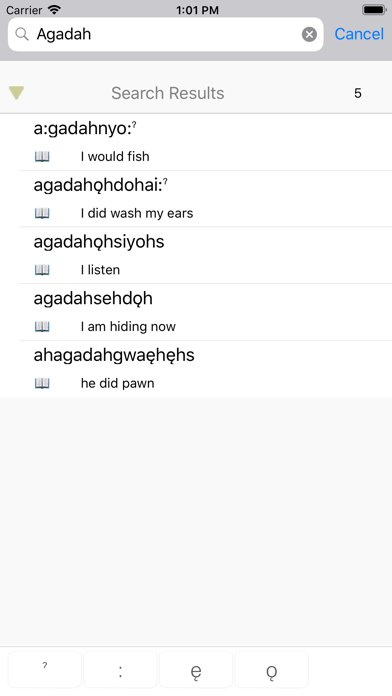
About Cayuga
Cayuga is an Iroquoian language. It is closely related to Seneca and to the other Northern Iroquoian languages of Mohawk, Oneida, Onondaga, and Tuscarora. Cayuga is spoken at Six Nations of the Grand River, near Brantford, Ontario, Canada.
History and acknowledgements
Research for the print version of the dictionary took place during 1994-2001. The dictionary was first published in 2002:
Froman, Frances, Alfred Keye, Lottie Keye & Carrie Dyck. 2002. English-Cayuga/Cayuga-English Dictionary. Toronto, Ontario: University of Toronto Press.
The sponsors for the print dictionary included the Sweetgrass First Nations Language Council Inc., the Ontario Ministry of Education--Ministry of Training, Colleges and Universities, Six Nations of the Grand River Band Council, and the Woodland Cultural Centre. Funding was provided by the Ontario Ministry of Education--Ministry of Training, Colleges and Universities, Project #4A, Aboriginal Language Standardisation Project, Cayuga Dictionary and Grammar. As well, grants to students working on the dictionary were provided by the Government of Canada and the University of Calgary (Canada Summer Jobs), and the Memorial University of Newfoundland Undergraduate Work Experience Program. Finally, in-kind support was provided by the Woodland Cultural Centre in Brantford, Ontario (near Six Nations).
Amos Key Jr., Language Program Director of the Woodland Cultural Centre, steered the dictionary project from the initial writing of the proposal to its completion, and chaired the steering committee for the Cayuga dictionary. Angie Monture (former administrative assistant for the Language Program at the Woodland Cultural Centre) often went beyond the call of duty to provide support, and to coordinate the dictionary meetings.
The steering committee members for the dictionary included Betsy Buck, Carrie Dyck (project coordinator, dictionary compiler), the late Frances Froman, Louise Hill, Ken Jacobs, Cindy John (former project coordinator), Eileen Johnson, Amos Key Jr. (Chair), Alfred Keye, Lottie Keye, and Cheryl Porter. The linguistic consultants for the dictionary included Carrie Dyck, Hazel Dean John (a Seneca linguist), and Michael Foster.
Language consultants for the dictionary included Frances Froman, Alfred Keye, and Lottie Keye, as well as Alta Doxtator, Arnie General, Cleveland General, Halsie Isaacs, Cassie Jacobs, Oliver Jacobs, Elva Jamieson, Irene Longboat, Huron Miller, Elizabeth Sandy, Pat Sandy, Elizabeth Silversmith, and Jimmy Styres. We are indebted to these people for their valuable knowledge of the Cayuga language.
Editors and administrative assistants included Betsy Buck, Hubert Buck, Carrie Dyck, Frances Froman, Elva Jamieson, Cindy John (former project coordinator), Lottie Keye, Alfred Keye, and Angie Monture. Frances Froman, Lottie Keye, and Alfred Keye painstakingly corrected the spelling of the Cayuga words in the dictionary. And finally, the summer students who worked on the print dictionary project were Jill Perry, Edward Smith, and Rhonda West.
The e-dictionary project began in 2005 and has been ongoing. A desktop app and website (cayugadictionary.ca) were developed by Dr. Carrie Dyck (Linguistics, Memorial University), working with former Memorial University graduate students Ranjeet Kumar (Masters, Computer Science), Dr. Wagdi Alwaragfeh (PhD, Computer Science), and kind volunteer Ghassan Al-Noubani. This stage of the project was funded by SSHRC Strategic Research Grant 856-2004-1082 and SSHRC Community-University Research Alliance #833-2009-1001.
This latest iteration of the e-dictionary was created by Dr. Chen Zhang (PhD, Computer Science) and Dr. Carrie Dyck, and was funded by Memorial Universitys Seed, Bridge, and Multidisciplinary Fund #211755.



